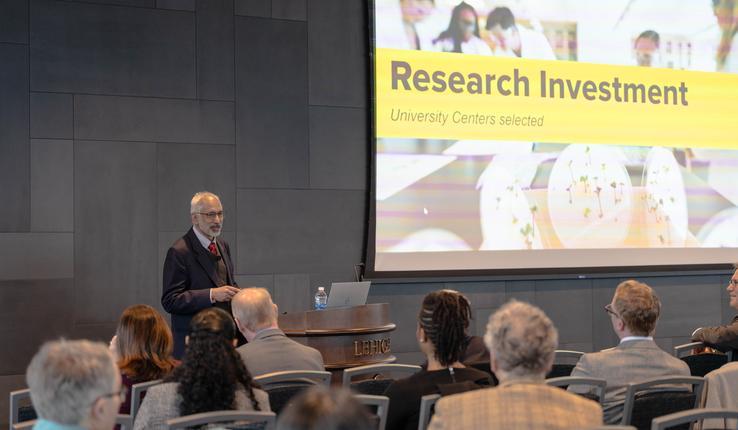Open Forums Held on Proposed Health College

Planning committee unveils six proposed themes under consideration for the proposed College of Integrated Health.
The committee charged with generating ideas for Lehigh’s proposed College for Integrated Health gave the campus community an update on its progress and sought input on six themes under consideration.
Committee co-chairs Ray Pearson, director of the Center for Polymer Science and Engineering at Lehigh, and Debbie Laible, professor of psychology, outlined the proposed themes: Biomedicine and Biotechnology, Environmental Health, Resilient Communities, Mind-body Connections, Science of Healthcare Delivery, and Healthy at Home. The two open forums, held in April at Linderman Library and the University Center, were well-attended by faculty and staff.
“This is a work in progress,” said Pearson, while encouraging written and verbal feedback on the proposals.
The committee began its work in Fall, after President John Simon presented a bold academic vision for Lehigh to the Board of Trustees. The plan, which the board unanimously endorsed, outlined a series of sweeping steps—including the formation of the new health college and other initiatives—to enable Lehigh to build on its legacy and stand among the best in higher education.
The new college would be Lehigh’s fifth.
Several criteria are being used to evaluate a proposed theme: innovation, whether it would enhance Lehigh’s visibility and reputation, the funding potential, the demand for degree programs, leverage of Lehigh’s existing strengths and the need for new strategic partnerships. Some of the proposals could be interdisciplinary and connect well to other areas of the new college, the co-chairs said.
Among the proposed themes:
- Biomedicine and Biotechnology would build on the university’s existing strengths in such areas as data science, biochemistry and neuroscience while allowing for new opportunities in biomarkers, nanotechnology, pharmacology and drug discovery and other areas.
- Environmental Health would center on preventing or controlling disease, injury and disability related to interactions between people and their environment, such as exposure to hazardous substances in air, water, soil and food; natural and technological disasters and climate change.
- Resilient Communities would explore why some individuals and communities are able to recover from chronic/acute adversity. Resilient communities include healthy individuals and families with access to health care and with the resources to care for themselves and others in both routine and emergency situations, the co-chairs explained.
- Mind-body Connections would focus on the connections between mind and body in promoting health. The goal would be to promote research on the intersection of mental and physical health at all levels, including policy and system levels, to allow an understanding of how policymakers and clinicians can facilitate the integration of mental and physical healthcare.
- Science of Healthcare Delivery would focus on scientific methodologies that improve the quality, efficiency, effectiveness and outcomes of healthcare delivery. It would combine theories and principles from analytics, data sciences, economics, healthcare finance and other areas.
- Healthy at Home would maximize and maintain the wellness of individuals and families outside of the healthcare setting, including the promotion of healthcare when healthy and the encouragement of disease management when ill.
For more information on the proposed themes, click here.
Posted on:




